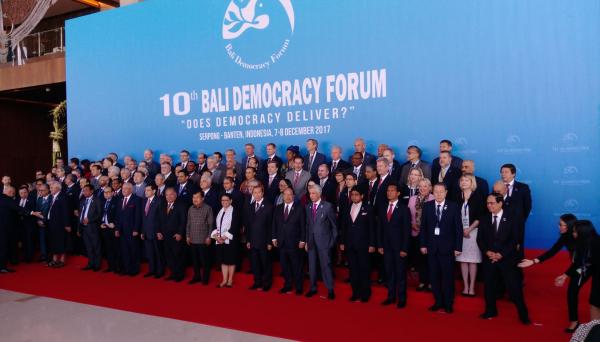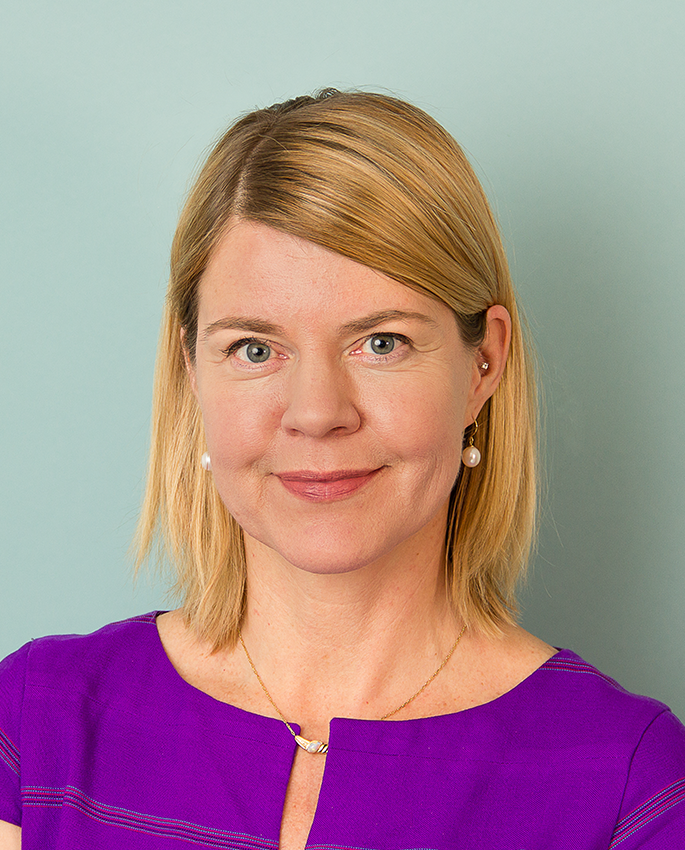10th Bali Democracy Forum: Statement by International IDEA
The 10th Bali Democracy Forum (BDF) with the theme 'Does Democracy Deliver?' was successfully organized in Jakarta, Indonesia on 7–8 December 2017. The BDF 2017 was attended by 96 countries and seven international organizations, including International IDEA.
For the first time ever, a parallel Bali Youth Democracy Forum 'From Campus to Democracy' was organized alongside with Bali Civil Society and Media Forum. In her opening remarks, Indonesia's Foreign Minister Retno Marsudi, condemned US decision to recognize Jerusalem as capital of Israel provoking reactions from many delegates.
Below is the statement made by International IDEA at the BDF, delivered by Leena Rikkila Tamang, Regional Director for Asia and the Pacific.

Statement by International IDEA
Director for Asia and the Pacific, Leena Rikkila Tamang
The Bali Democracy Forum | Jakarta, Indonesia | 7–8 December 2017
Honourable Chair, Madame Minister, Distinguished Delegates, Friends,
The theme of this year’s Bali Democracy Forum: Does Democracy Deliver? touches the very core of many global and regional debates about the type and character of democracy we wish to strive toward. Citizens assess the quality of democracy based on state’s ability to deliver public goods and to foster development and prosperity. The failure to provide services: clean water, health care, education, welfare safety net, job opportunities, security, and access to justice, undermines both the legitimacy of state institutions and support for democratic governance.
Moreover, recent media reports and public opinion polls are warning about the apparent growing threats to democracy, suggesting that democracy is in decline. There are certainly reasons to be concerned—democracies are facing complex challenges from food scarcity to conflict and from climate change to terrorism and organized crime, from populism to corruption, testing democracy’s resilience. That is however not the whole truth.
I represent an intergovernmental organization—including Indonesia, a Member State—whose core mandate is to support sustainable democracy worldwide. This November, International IDEA published a report, The Global State of Democracy: Exploring Democracy’s Resilience, which provides a health check of democracy worldwide. Contrary to negative views of democracy in decline, when looking at democracy globally and over time, the picture is positive, based on findings of the Indices. We see that democracy has made considerable progress since 1975 and while the progress has slowed down since the 1990’s and we see worrying developments, this does not yet indicate that democracy is declining or regressing at a global level. On the contrary, democracy has proven to be resilient, able to recover from societal crisis and backsliding.
The world has also made huge progress in reducing extreme poverty and improving basic welfare around the world. However, rising inequality within countries has become the defining challenge of the century. The way wealth, power and privilege are distributed affects the quality of governance and undermines the sturdiness and resilience of a democracy by limiting effective service delivery, social cohesion, political representation, the legitimacy of political institutions, and driving violence and armed conflict.
There are no easy answers on how to counter inequality. However, a variety of factors have enabled different states to make some progress on this front within democratic settings. These include sound and innovative politics addressing the intersectional nature of inequality, and required state capacity, elite commitment, effective political parties, reform coalitions, mobilization and ideas from below, and the framing of shared national visions and destinies. International cooperation is required to fight tax avoidance and capital flight. In brief, research suggests that democracy is a necessary even if not sufficient pre-condition for targeting inequality.
Building resilient democracies and preventing backsliding relies on active citizens and institutions. If citizens are strongly committed to democracy, it will persist as a permanent ideal. Improving democracy’s resilience begins with establishing or restoring citizen trust in the efficacy of democratic politics and defending it.
We cannot take democracy for granted.
I wish to express my sincere gratitude to the Indonesian Government, her Excellency Minister of Foreign Affairs of Indonesia and the staff of her Ministry. Initiatives like the Bali Democracy Forum are needed to support the dynamic, flourishing democracies and foster mutual learning.
Before finishing, I would like to take this opportunity to remember late Dr Surin Pitsuwan who, very un-expectantly, passed away on 30 November. As you know Madam Chair, Pitsuwan held a key role in the political history of his country,Thailand, and his region. He served as Thailand's Minister of Foreign Affairs from 1997–2001, and as Secretary-General of the Association of South East Asian Nations (ASEAN). Pitsuwan was a great and very valued contributor to the work of International IDEA, serving as the Chair of the Board since 2014. At last year’s Bali Democracy Forum, and at the Bali Civil Society and Media Forum, he gave the most inspirational and spirited talk about religion, democracy and value of diversity. His enthusiasm and passion for democracy will be remembered by all those who crossed his path during these years. Pitsuwan was a true champion of democracy and will be sorely missed.
Thank you Madam Chair.
